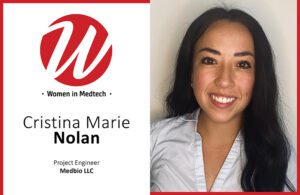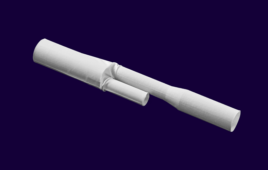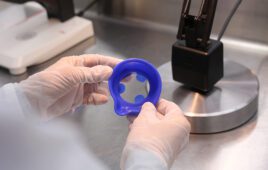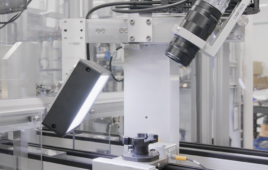 Cristina Nolan is a project engineer at Medbio LLC, an injection molding facility focused on medical device manufacturing. Skilled in project management, problem solving, and Lean Six Sigma, she enjoys working with multifaceted teams in order to complete projects. Cristina worked her way up from engineering intern to project engineer at Medbio LLC and spent time working in every department of the company to understand each facet of the company. Cristina is a Lean Six Sigma Green Belt, a certified ISO 13485:2016 Internal Auditor, and has completed University at Buffalo’s Project Management Certificate program. Her coworkers describe her as a driven, intelligent, quick learner with a bright future ahead of her. Outside of work, Cristina enjoys traveling, skiing, and hiking with her husband and German Shepherd.
Cristina Nolan is a project engineer at Medbio LLC, an injection molding facility focused on medical device manufacturing. Skilled in project management, problem solving, and Lean Six Sigma, she enjoys working with multifaceted teams in order to complete projects. Cristina worked her way up from engineering intern to project engineer at Medbio LLC and spent time working in every department of the company to understand each facet of the company. Cristina is a Lean Six Sigma Green Belt, a certified ISO 13485:2016 Internal Auditor, and has completed University at Buffalo’s Project Management Certificate program. Her coworkers describe her as a driven, intelligent, quick learner with a bright future ahead of her. Outside of work, Cristina enjoys traveling, skiing, and hiking with her husband and German Shepherd.
What first drew you to medtech? When did you first know you wanted to be in the industry?
I ended up in medtech by trial and error. In high school engineering intimidated me, and my physics class was interesting, but challenging. When I went to college, I chose to major in biology because I wanted to work in the medical field. After working in both a hospital and a medical research environment, I realized that biology was not the path for me. Around the same time, I met my husband who was studying industrial engineering. When we went to the library to study together, I discovered that I enjoyed learning about engineering more than biology. When I finally came to the realization that I should be studying engineering, it was too late to change majors. I ended up graduating with a B.S. in Biological Sciences, but I quickly applied to a master’s program for materials science. Every other student in my class had engineering backgrounds, but I was able to use my biological background and apply it to materials engineering. In 2017, I presented my master’s thesis on 3D printing hydrogels that could replace worn cartilage. This blending of the medical and engineering fields seemed to be the perfect fit for me, and fortunately I found the perfect internship at Medbio. I was hired as an engineering intern in 2017, and I became engrossed in manufacturing medical devices. I have been working for Medbio ever since, and I have advanced from an engineering intern to a project engineer.
In your opinion, what more can be done to promote the greater participation of young women in the medtech industry today?
EXPOSURE! My company, Medbio, does a wonderful job of bringing both high school and college interns in throughout the year. I wish I would have had the opportunity to at least tour a manufacturing facility when I was in high school just to see the different types of careers it can lead to. Even if students are not interested in manufacturing, they should at least be exposed to it. It is such a massive industry, and I think most people simply think of manufacturing as Ford’s Model T assembly line. In reality, it is so much more. I hope every manufacturing facility opens its doors the way Medbio does and sends their employees to career days to speak at high schools and colleges about working in manufacturing. More students would enter manufacturing if they just knew what it was.
What projects, past or present, have made you love what you do?
I am currently heading a project where we manufacture almost every single part of an assembly for a women’s healthcare device. I enjoy being able to snap parts together and show my coworkers what an almost full assembly looks like and how it works. I have seen the device advertised in television commercials and in print magazines. It is such an amazing feeling to see parts that I have worked on be sold to people around the country. I also find it rewarding that my project improves women’s health.
What projects are you most looking forward to?
In the plastics manufacturing industry, we produce a lot of single-use items. I consider myself somewhat of an environmentalist, and it is such a terrible feeling when we have to throw parts away before they even get to the end user because of an injection molding flaw. Some of our customers are moving towards using more environmentally friendly plastics and are aiming to become more carbon neutral. I was approached recently about sampling some biodegradable plastics. If the sampling is successful, we may be able to replace some of the plastics we currently use with biodegradable versions. I love to see this shift in the way people think about plastics and how they will affect the earth tomorrow.
What are some of the barriers women face in today’s medtech industry?
I believe that young women are not exposed to the worlds of engineering and manufacturing as viable career paths. Most people do not look at everyday objects and wonder how the individual parts are made and assembled. There are different people working on each stage of production. On one level, there are people who run the machines, assemble the individual parts, and package the assemblies. On another level, there are people who design, improve, and manage the parts and assembly processes. Then, specifically in my field of injection molding, there are toolmakers who design, build, and maintain the molds that physically manufacture our products. There are countless jobs and opportunities in the manufacturing industry, and I do not think most people are aware of them. Additionally, more and more manufacturing is moving back to the United States, which creates even more jobs. I believe the first time I stepped into a manufacturing facility was when I was interviewing for my internship at Medbio. When most people hear the word factory, they think of a hot and dirty place where people labor in poor conditions. However, when you work in medical device manufacturing, it is about as clean as you can get. I think manufacturing and engineering should be advertised to women just as adamantly as nursing and teaching
Describe your biggest leadership challenge. How did you conquer it or resolve it, or what was the outcome?
I think my biggest challenge has been convincing others to listen to me. I am young, less experienced, and I have no one who directly reports to me. This means that I am in charge of projects, but I cannot actually tell anyone what to do. I must use the power of persuasion to direct my coworkers and keep projects on track. Sometimes this works, but sometimes it does not. As time has progressed, I have learned to work with people with different personalities. There are some people who require every single piece of information before they do something. There are others who will not take my advice directly, but who will listen to my boss (who generally supports my decisions). Some people are strict rule followers, and others see rules as guidelines and will bend them if necessary. It is crucial for me to get to know my coworkers and how they operate in order to achieve a common goal in a timely fashion.
In your opinion, what more can be done to promote the greater participation of young women in the medtech industry today?
EXPOSURE! My company, Medbio, does a wonderful job of bringing both high school and college interns in throughout the year. I wish I would have had the opportunity to at least tour a manufacturing facility when I was in high school just to see the different types of careers it can lead to. Even if students are not interested in manufacturing, they should at least be exposed to it. It is such a massive industry, and I think most people simply think of manufacturing as Ford’s Model T assembly line. In reality, it is so much more. I hope every manufacturing facility opens its doors the way Medbio does and sends their employees to career days to speak at high schools and colleges about working in manufacturing. More students would enter manufacturing if they just knew what it was.
Why is it important for companies to be more inclusive and have more women in charge?
Seeing powerful women have top positions in companies allows women working at lower levels to see that they can also achieve top positions. It takes one woman to break the barrier in all-male work environments. Additionally, it needs to become more normalized for men to have female bosses. For whatever reason, many men have less respect for female bosses than they do for male ones. Once people become used to engineering is being able to problem solve. I believe that men and women can be equally intelligent and adept problem-solvers. However, I also believe that women often think differently than men. A woman may present a different perspective to a problem, and even if her interpretation is not the ultimate solution, her contributions may raise a position a man may not have considered. Having diversity in the discussion can lead to more thoroughly considered solutions.




